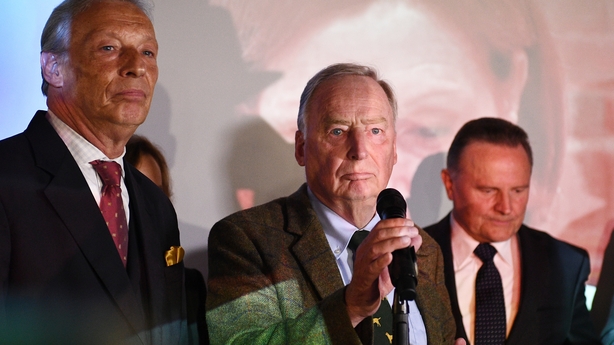German Chancellor Angela Merkel has begun the tough task of trying to build a coalition government after securing a fourth term as chancellor in an election which saw her support slide and the far right making significant gains.
Damaged by her handling of the 2015 migrant crisis, Ms Merkel's conservative Christian Democrats took 33% of the vote, down 8.5 points from the 2013 election and hitting its lowest level since 1949.
The German establishment was shocked as conservative voters flocked to the anti-immigration Alternative for Germany (AfD), which took 12.6% of the vote.
It was the first time a far-right party has entered the German parliament in more than half a century.
However, Ms Merkel's party is still the biggest parliamentary bloc and Europe's most powerful leader said her conservatives would set about building the next government, adding she was sure a coalition would be agreed by Christmas.
"There cannot be a coalition government built against us," she said.
Martin Schulz, leader of the Social Democrats that have governed with Merkel since 2013, said his party had no choice but to go into opposition after dropping to a post-war low of 20.5%.
"We have understood our task -- to be a strong opposition in this country and to defend democracy against those who question it and attack it," Mr Schulz told party members to applause.
A weaker Merkel at the head of a potentially unstable coalition with the pro-business Free Democrats (FDP) and Greens, untested at national level, unsettled investors.
The euro slipped in early Asian trading this morning, trading down 0.2% at $1.1930, with the prospect looming of months of uncertainty in Europe's biggest economy.
"Earthquake, warning, landslide, shock. This election can only be described with such drastic vocabulary. It was an anti-Merkel election which ended as a pro-Merkel election," said Germany's Handelsblatt business daily.
Some business leaders were alarmed, saying a party likened by the foreign minister to Nazis could hurt Germany.
"The AfD in the German Bundestag (parliament) is damaging our country," employers' association BDA leader Ingo Kramer said. "The other parties now have the task of cornering the AfD in direct parliamentary debate."
However, just a day after the election, the AfD showed signs of fracturing as co-leader Frauke Petry, one of its most prominent faces, said she would not sit in parliament with AfD members.
It was not immediately clear why she was making such a move.
One of the AfD's leading candidates, Alexander Gauland, gave a foretaste of what was to come, vowing to "hound" Ms Merkel and "get our country and our people back".

Industry leaders urged Ms Merkel to move fast.
"Our companies need clear signals. Now it's all about averting damage to Germany as a place of business," Dieter Kempf, president of the BDI industry association, said.
Ms Merkel's main option in forming a coalition is to pursue a three-way partnership.
A "Jamaica" alliance of her conservative bloc, the FDP, on 10.7%, and the Greens, on 8.9%, could be fragile due to fundamental differences on issues from migrants to tax, the environment and Europe.
In particular, the prospect of Ms Merkel sharing power with the FDP is likely to create problems for deeper integration of the euro zone as proposed by French President Emmanuel Macron.
Minister for Foreign Affairs Simon Coveney said that it is "extraordinary" that Ms Merkel will serve a fourth term, describing her as a strong and popular leader and a hugely important figure in the EU.
He said he did not believe her re-election would cause any problems to Brexit negotiations.
Mr Coveney said the presence of right wing politicians in the Bundestag "was not welcome", but that Chancellor Merkel brought sensible forward looking politics to the next German government.

